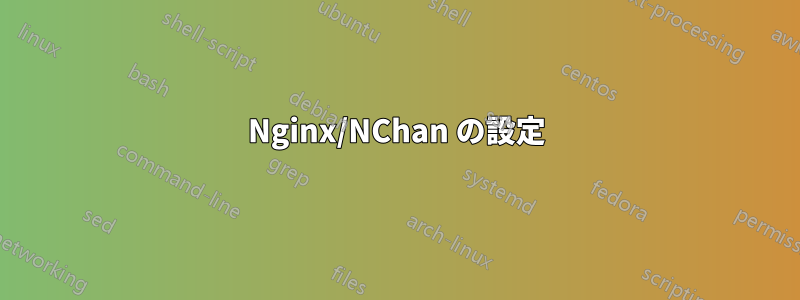
私が開発しているモバイル アプリでは、WebSocket を使用してさまざまな情報をサブスクライブ/公開しています。ほとんどの場合、アプリ側の WebSocket は単なるリスナーです。ただし、メッセージを公開する場合もあります。
サーバー側では、Nginx 上で動作する [NChan][1] の組み合わせを使用してこれを処理しています。NChan の非常に優れた機能の 1 つは、Web ソケットを「多重化」する機能です。つまり、複数のチャネルで pub/sub を実行できます。モバイル アプリを作成する場合、この機能は整理整頓とバッテリーの耐久性を大幅に向上させます。
[NChanドキュメント][2]で説明されているように、多重化されたpubsubチャネルを設定しました
location ~ /pubsub/(\w+)/(\w+)/(\w+)/(\w+)/(\w+)$
{
nchan_pubsub;
nchan_channel_id "$1" "$2" "$3" "$4" "$5" "control";
nchan_publisher_upstream_request /alter;
}
上記の3行目は、受信したリクエストを別のサーバーにchan_publisher_upstream...転送します。pub
location = /alter
{
proxy_pass https://example.com;
proxy_set_header X-Publisher-Type $nchan_publisher_type;
proxy_set_header X-Prev-Message-Id $nchan_prev_message_id;
proxy_set_header X-Channel-Id $nchan_channel_id;
proxy_set_header X-Original-URI $request_uri;
proxy_set_header X-Forwarded-For $proxy_add_x_forwarded_for;
proxy_set_header Upgrade $http_upgrade;
proxy_set_header Connection "upgrade";
}
index.php他のサーバーでは、サーバーのルートフォルダー内でPHPを実行するためにNginxを設定しました。
<?php
trigger_error(json_encode(getallheaders()));//a test to see that the proxy pass is actually
happening
header("HTTP/1.1 304 Not Modified");
//if successful should cause the incoming request to be published without changes
//header("HTTP/1.1 204 No Content");
//when enable will suppress the incoming request (optionally after doing some server-side
//stuff with the incoming request data
//header("HTTP/1.1 200 OK");
//echo 'New Content!';
//when enabled should replace the incoming requestt content with the new one
?>
私が知る限り、私はNChanの指示にかなり忠実に従っています。しかし、この設定を使用して、今定義したpubsubチャネルに公開しようとすると、クライアント接続が予期せず閉じられてしまいます。このテストを実行するために、私はいくつかの簡単なJavaScriptを使用しています。
var socket;
function connectPubSub()
{
socket = new WebSocket("wss://app.server.url/pubsub/personal/cause/beacon/grid/chat");
socket.onopen = whenOpen;
socket.onmessage = whenMessage;
socket.onclose = whenClose;
socket.onerror = whenError;
}
function whenOpen(e){console.log("[open] Connection established");}
function whenMessage(event){console.log(`[message]:${event.data}`);}
function whenClose(event)
{
if (event.wasClean)
alert(`[close] Connection closed cleanly, code=${event.code} reason=${event.reason}`);
else console.log('[close] Connection died');
}
function whenError(error){console.log(`[error] ${error.message}`);}
function sendMessage(msg){socket.send(msg);}
この時点で、次のものを発行しようとすると
connectPubSub();
sendMessage('Hello world!');
以下のような出力が得られます
[open] Connection Established
Websocket connection to app.server.url failed:Close received after close
エラーイベントは以下のとおりです
bubbles: false
cancelBubble: false
cancelable: false
composed: false
currentTarget: WebSocket {url: "wss://app.server.url/pubsub/personal/cause/beacon/grid/chat",
readyState: 3, bufferedAmount: 0, onopen: ƒ, onerror: ƒ, …}
defaultPrevented: false
eventPhase: 0
isTrusted: true
path: []
returnValue: true
srcElement: WebSocket {url: "wss://app.server.url/pubsub/personal/cause/beacon/grid/chat",
readyState: 3, bufferedAmount: 0, onopen: ƒ, onerror: ƒ, …}
target: WebSocket {url: "wss://app.server.url/pubsub/personal/cause/beacon/grid/chat",
readyState: 3, bufferedAmount: 0, onopen: ƒ, onerror: ƒ, …}
timeStamp: 83208.4250000189
これは困惑させられます。NChanのドキュメントに従って、多重化されたチャネルにメッセージを公開し、pubsubプロキシサーバーでメッセージの内容(JSON)を調べてから、何をすべきかを決めるだけだと思っていました。
- メッセージを通過させる(HTTP 304を発行する)
- サーバー側でアクションを実行し、メッセージを抑制します(HTTP 204 を発行します)
- メッセージを変更して送信します(HTTP 200を発行します)
Nginx 構成ディレクティブに関する私のかなり不十分な知識が、ここで私を失敗させているのかもしれません。何が間違っているのでしょうか?
ここで何が起こっているのか、今や私は突き止めることができた。ここでの問題の根源は、
proxy_pass https://example.com;
指令。これを変更すれば
proxy_pass https://example.com/index.php;
期待通りに動作します。しかし、なぜこのようなことが起こるのかは私にはまだ分かりません。私のNginxのデフォルト設定ファイルの先頭には、次の行があります。
server
{
root /path/to/root;
index index.php;
server_name example.com;
上記の 3 行目は、Nginx に任意のフォルダー/サブフォルダーの場所で index.php を実行するように指示するのに必要なほぼすべてだと思いましたindex index.php。明らかにそうではありませんか? [1]:https://nchan.io
[2]:https://nchan.io/#getting-started


